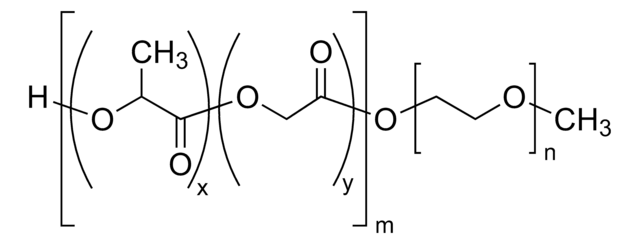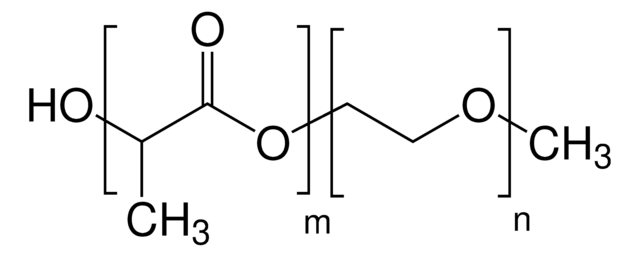764760
Poly(ethylene glycol) methyl ether-block-poly(lactide-co-glycolide)
PEG average Mn 2,000, PLGA average Mn 11,500
Synonyme(s) :
PEG-PLGA, Polyethylene glycol, mPEG-b-PLGA
About This Item
Produits recommandés
Forme
pellets
Niveau de qualité
Ratio alimentaire
lactide:glycolide 50:50
Poids mol.
PEG average Mn 2,000
PLGA average Mn 11,500
average Mn 13,500 (total)
Intervalle de dégradation
1-4 weeks
Température de transition
Tm 298-303 °C
Tg 40 °C (PDLLA block)
Tg 6 °C (PEG block)
PDI
≤2.0
Température de stockage
2-8°C
Vous recherchez des produits similaires ? Visite Guide de comparaison des produits
Description générale
Application
Caractéristiques et avantages
- Good biocompatibility, low immunogenicity and good degradability.
- Properties can be easily modulated by changing the block copolymer segment sizes to suit a particular application.
Code de la classe de stockage
11 - Combustible Solids
Classe de danger pour l'eau (WGK)
WGK 3
Point d'éclair (°F)
Not applicable
Point d'éclair (°C)
Not applicable
Faites votre choix parmi les versions les plus récentes :
Déjà en possession de ce produit ?
Retrouvez la documentation relative aux produits que vous avez récemment achetés dans la Bibliothèque de documents.
Les clients ont également consulté
Articles
Micelle formation addresses low solubility in IV drug delivery, overcoming clinical limitations.
Micelle formation addresses low solubility in IV drug delivery, overcoming clinical limitations.
Micelle formation addresses low solubility in IV drug delivery, overcoming clinical limitations.
Micelle formation addresses low solubility in IV drug delivery, overcoming clinical limitations.
Notre équipe de scientifiques dispose d'une expérience dans tous les secteurs de la recherche, notamment en sciences de la vie, science des matériaux, synthèse chimique, chromatographie, analyse et dans de nombreux autres domaines..
Contacter notre Service technique







